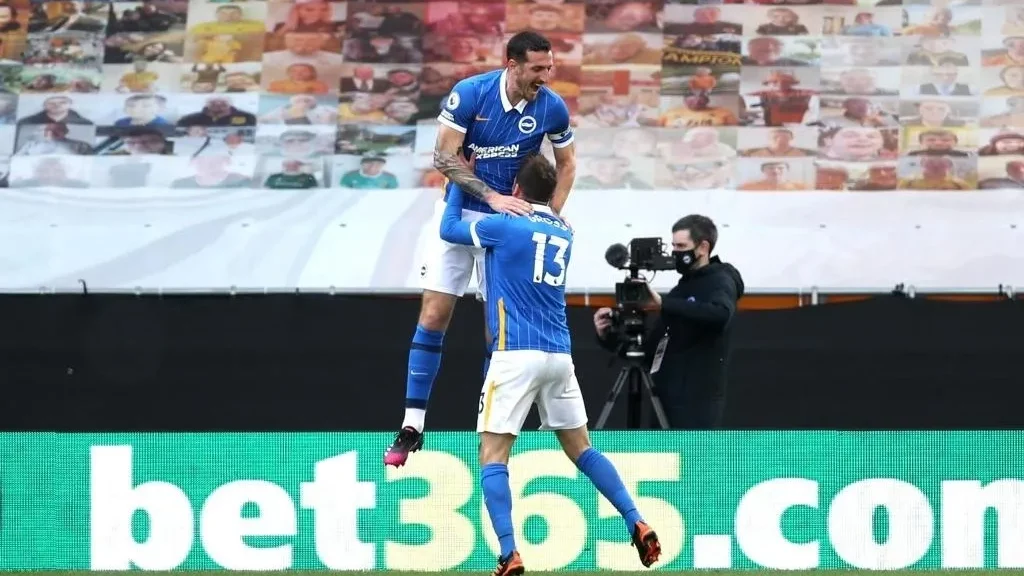The voluntary whistle-to-whistle ban is not stopping children from seeing gambling advertising in football, with pitch-side adverts ever present during matches.
Words by Tom Fleming
The whistle-to-whistle ban
You’ve probably heard a lot about the whistle-to-whistle ban lately. The ‘ban’, which was voluntary and enacted in 2019, supposedly limits the number of children exposed to gambling adverts. It’s also an admission of the harm that gambling adverts cause.
Under the ‘ban’, which runs until the 9pm watershed, gambling adverts cannot be broadcast within 5 minutes of the start or end of a football game. However, gambling adverts can be broadcast during the build-up to a game in the middle of the day, which is an increasingly important part of the viewing experience
For example, ITV’s coverage of the Euro 2020 final between England and Italy started 1 hour and 40 minutes before the match kicked off, offering viewers almost the same amount of pre-match build-up as a standard 90-minute game (including half time). Disappointingly, ITV showed numerous gambling adverts during this time.
A loophole?
As the whistle-to-whistle ban only covers TV adverts, it provides gambling operators with a handy loophole to continue advertising harmful products in front of children. Alongside many others, we’ve presented an overwhelming argument for banning shirt sponsorship here and here, but ahead of the new season we want to focus on the ominous presence that is pitch-side advertising.

Pitch-side adverts
Pitch-side adverts have become an increasingly recognisable part of the match day experience, especially during the pandemic, when stadiums were empty or only partially full. Toward the end of the truncated 2020/21 season, Tottenham played Aston Villa at home in front of a partially full stadium. Fans lucky enough to get tickets were seated in the upper stands, with the pitch-side seats – those most visible on the TV coverage – reserved for messages from sponsors and advertisers, including Betway and William Hill in prime position.
Technology has also come a long way from the static advertising boards of the 1990s, to the more eye-catching, animated, digital advertising we see encasing every match today. Pitch-side adverts also carry an advantage for advertisers as they are most visible when the audience’s attention is most focused and are likely to appear in replays, giving them more exposure.

How much of a problem are pitch-side adverts?
A big problem, as it turns out. Research by Cardiff Metropolitan University found that:
“The highest levels of exposure are on commercial channels where adverts are present, but every shirt logo, pitch side hoarding, logo on manager’s training kit, logos on press conference and post-match interview ‘wall’ (the backdrop covered in sponsor’s logos) will also appear on the non-commercial BBC’s live coverage (FA Cup), preview shows such as Football Focus and highlight programmes such as Match of the Day (MOTD).”
Match of the Day, which is broadcast on BBC One and shows highlights of the Premier League, the most-watched league in the world, is watched by around 7 million people each week, including on demand viewers. Further research by Cassidy and Ovenden (2017) found there were:
- 764 instances of gambling marketing during three separate Match of the Day broadcasts
- Of these, over 65% were pitch-side adverts
Echoing this findings, a 2020 study by the Royal Society for Public Health (RSPH) found that football contained 2.75 gambling references per minute, with most of these references in “the area-of-play, around pitch border or branded shirts.”
It’s becoming increasingly clear that pitch-side adverts play a prominent role in gambling’s escalating infiltration of football, especially with the potential threat of a ban on shirt sponsorship looming. Recent research by BMC Public Health concluded:
“2595 promotional gambling references were recorded over five football matches with an average of 2.75 references per broadcast minute […] whilst in football they were most frequently displayed around the pitch”
To add to this, a 10-second goal clip featured over 60 mentions of the word ‘bet’ during a Premier League game between Wolves and Burnley, which was broadcast on BBC’s Football Focus at midday.
Advertising works
We know that advertising, in all its different forms, works. The simple fact is that companies wouldn’t pay to produce and display it if it didn’t. We also know that young people identify strongly with the brand or company that sponsors their sports team.
But this isn’t just about brand awareness, there is overwhelming evidence that advertising, including seeing the word ‘bet’ more than 60 times in 10 seconds, increases people’s desire to gamble.
The question then, is this: how can a product that is deemed unsafe to advertise within 5 minutes of a match during the day, be considered safe to be plaster around a stadium for the entirety of that same match?
Clearly it can’t.
As things stand, it’s up to the clubs, competitions and third-party agencies to decide which companies and brands they let advertise around the pitch. More often than not, it’s existing sponsors or partners. This isn’t good enough – the Government must do more to protect children and prevent harm.
The whistle-to-whistle ban simply isn’t good enough either, with the RSPH concluding:
“The voluntary ‘whistle-to-whistle’ agreement introduced by the IGRG therefore does not include much of the main elements of sponsorship activity including shirt sponsorship or pitch-side advertising, most of which appeared in-play and therefore will coincide with peak audience attention. It is doubtful that this proposal will do much to reduce viewers’ exposure to gambling marketing, and further mandatory restrictions may be required.”
We are calling on the Government to ban all gambling advertising in football, including pitch-side adverts and shirt sponsorship. If you haven’t already, please add your name to our petition.

Our next event
This month (July), we’ll be at Billericay Town vs Lewes (27th) and Forest Green Rovers vs Swansea (28th). All four teams support our campaign and have pledged to reject gambling sponsorship money.
Both matches will feature pitch-side Big Step and Gambling with Lives advertising and we’ll be doing our bit to raise awareness about gambling harm and the dangers of gambling advertising before each match.
If you’d like to join us, please email [email protected]


